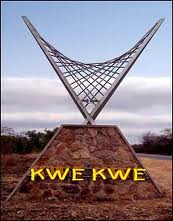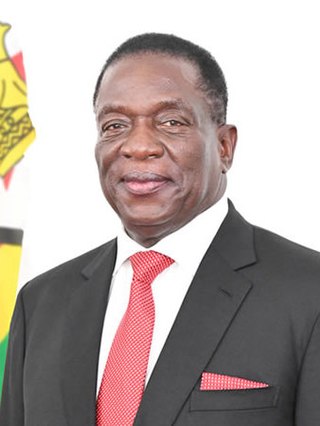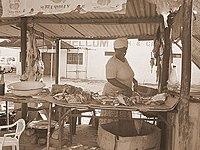
The Zimbabwe African National Union – Patriotic Front (ZANU–PF) is a political organisation which has been the ruling party of Zimbabwe since independence in 1980. The party was led for many years under Robert Mugabe, first as prime minister with the Zimbabwe African National Union (ZANU) and then as president from 1987 after the merger with the Zimbabwe African People's Union (ZAPU) and retaining the name ZANU–PF, until 2017, when he was removed as leader.

Roy Leslie Bennett was a Zimbabwean politician and member of the British South Africa Police. He was also a member of the House of Assembly of Zimbabwe for the seat of Chimanimani, where he was affectionately known as Pachedu. He was the Treasurer of the Movement for Democratic Change party led by Morgan Tsvangirai and a member of the Senate of Zimbabwe. He was set to become the Deputy Minister of Agriculture of Zimbabwe until President Robert Mugabe refused to swear him in.

Kwekwe, originally known as Que Que, is a city in the Midlands province of central Zimbabwe. The city has a population of 119,863 within the city limits, as of the 2022 census, making it the 7th-largest city in Zimbabwe and the second-most populous city in the Midlands, behind Gweru.

Parliamentary elections were held in Zimbabwe on 24 and 25 June 2000 to elect members of the House of Assembly. The electoral system involved 120 constituencies returning one member each, elected by the First Past the Post system, with the President of Zimbabwe then nominating 20 members and ten further members from the Tribal Chiefs sitting ex officio. This was the first national election in which Zimbabwe's ruling ZANU-PF party had faced any real opposition since the 1980s. The newly formed Movement for Democratic Change challenged Mugabe's control of parliament. The MDC won 57 of the 120 elected seats, with 47% of the popular vote. Zanu-PF won 63 seats and carried approximately 48% of the popular vote.
The following lists events that happened during 2000 in Zimbabwe.

Emmerson Dambudzo Mnangagwa is a Zimbabwean politician who has served as President of Zimbabwe since 24 November 2017. A member of ZANU–PF and a longtime ally of former President Robert Mugabe, he held a series of cabinet portfolios and was Mugabe's Vice-President until November 2017, when he was dismissed before coming to power in a coup d'état. He secured his first full term as president in the disputed 2018 general election. Mnangagwa has been re-elected in 2023 with 52.6% of the votes. Nelson Chamisa came in second with 44%.
Gokwe Centre is a rural town in the Midlands province in Zimbabwe. The town is usually referred to as "Gokwe Centre" because the larger region is called Gokwe.
Amaveni Township is a high density suburb in Kwekwe, Zimbabwe. It is about 5 kilometres (3 mi) west of the city's central business district. The township's name of 'Amaveni' according to one of its first residents, the late Jonas Macela Nkomo (1908–2002), was derived from a Ndebele army's battalion that was called by the same name. The battalion fought during the 1893 Anglo-Ndebele war in Matebeleland region of Zimbabwe.
Mbizo Stadium is a small stadium in Mbizo township, north-west of the city of Kwekwe in Zimbabwe. It is used for various activities, from hosting music concerts by popular artists like Alick Macheso, Simon Chimbetu to Tongai Moyo, a native of the town. The stadium is located in Mbizo section one, the oldest part of the township. It has a capacity of about a thousand people.

Kwekwe, originally known as Que Que, is a district in Zimbabwe.

Prior to 1994, immigrants from elsewhere faced discrimination and even violence in South Africa due competition for scarce economic opportunities. After majority rule in 1994, contrary to expectations, the incidence of xenophobia increased. Between 2000 and March 2008, at least 7 people died in what were identified as xenophobic attacks. In May 2008, a series of attacks left 12 people dead; although 10 of those killed were South African citizens. The attacks were partly motivated by xenophobia. In 2015, another nationwide spike in xenophobic attacks against immigrants in general prompted a number of foreign governments to begin repatriating their citizens. A Pew Research poll conducted in 2018 showed that 62% of South Africans viewed immigrants as a burden on society by taking jobs and social benefits and that 61% of South Africans thought that immigrants were more responsible for crime than other groups. Based on various police reports 60% of suspects arrested for violent crimes in Gauteng South Africa are illegal immigrants, between 2015 - 2016. The number of foreign nationals who have been arrested by the Johannesburg Metropolitan Police Department (JMPD) between 2016 and 2019 sit at 7841. Between 2010 and 2017 the illegal immigrant community in South Africa increased from 2 million people to 4 million people. The proportion of South Africa's total population that is foreign born increased from 2.8% in 2005 to 7% in 2019, according to the United Nations International Organization for Migration, in spite of widespread xenophobia in the country. This made South Africa the largest recipient of immigrants on the African continent in 2019.
The second round of voting in the Zimbabwean presidential election of 2008 was held between Robert Mugabe and Morgan Tsvangirai after the first round failed to produce a 50% majority for either candidate. The election process was marred by violence against and intimidation of voters and party workers, which eventually led to the withdrawal of Tsvangirai from the poll. This left Mugabe as the winner of, effectively, a one-candidate election.

The Movement for Democratic Change (MDC) was a Zimbabwean political party organised under the leadership of Morgan Tsvangirai. The MDC was formed in 1999 as an opposition party to President Robert Mugabe's Zimbabwe African National Union – Patriotic Front (Zanu-PF). The MDC was made up of many civic groups who campaigned for the "No" vote in the 2000 constitutional referendum, which would limit a president's service to two terms, before the introduction of a prime minister, as well as giving legal immunities to the state.

Morgan Richard Tsvangirai was a Zimbabwean politician who was Prime Minister of Zimbabwe from 2009 to 2013. He was president of the Movement for Democratic Change, and later the Movement for Democratic Change – Tsvangirai (MDC–T), and a key figure in the opposition to former president Robert Mugabe.

The Mid West Rhinos is one of the five cricket Zimbabwean cricket franchises. They are a first-class cricket team, based in Midlands Province and the Mashonaland West area. They play their home matches at Kwekwe Sports Club in Kwekwe.
Sakubva township is a high-density suburb in the city of Mutare, Zimbabwe, which contains nearly a quarter of the population of Mutare despite an area of less than four square miles. It was the first high-density suburb (township) being established in Mutare. At that time, it was located in the Old Location section of Sakubva. It is the poorest of Mutare's suburb and its economy is centred on a large outdoor food and flea market.
Tichafa Samuel Parirenyatwa was Zimbabwe's first trained black physician, medical doctor and the first vice-president of the Zimbabwe African People's Union (ZAPU). He rose to prominence during ZAPU's political struggle against the colonial administration in Southern Rhodesia.
On 21 November 2014, a stampede occurred at Mbizo Stadium in Kwekwe, Zimbabwe, killing 11 and injuring 40 people. Reuters reported that around 30,000 people attended a religious service officiated by Walter Magaya. After the service, the crowd left toward a single exit in a stampede, killing four immediately; seven others were pronounced dead at hospital. The Business Standard reported that the stampede was caused by police firing teargas after some of the crowd attempted to break off parts of the stadium wall to exit.
The following lists events that happened during 2014 in Zimbabwe.










